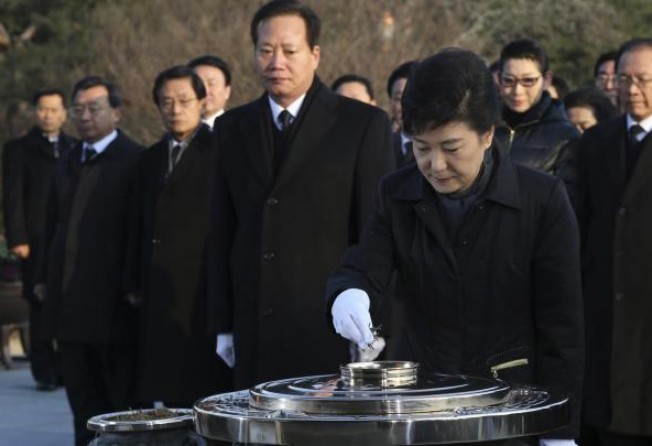Park Geun-hye to balance policy on North Korea
President-elect of South Korea promises that she will adopt a more balanced policy towards Pyongyang than that taken by her predecessor

A massive issue lies in wait for South Korean president-elect Park Geun-hye when she assumes office in February, relations with the north.
Since the establishment of two states in 1948, the issue has stumped her predecessors. Neither hardliners wielding sticks nor appeasers dangling carrots have managed to curb Pyongyang's behaviour.
President Lee Myung-bak has frozen aid and contact in a bid to force North Korea to denuclearise. That policy has failed, and Lee's hard-line stance was more than reciprocated.
In 2010, North Korea torpedoed a South Korean warship and shelled a South Korean island, killing a total of 50 people.
But before Lee, 10 years of a "sunshine policy" of unconditional engagement and aid did nothing to halt Pyongyang's missile or nuclear programmes.
Park, who met the late Kim Jong-il in 2002, ran on a conservative ticket, but is promoting a softer stance toward Pyongyang than Lee's.
She labels it "trustpolitick". This foresees a gradual resumption of aid and contacts to create an atmosphere of reciprocity in which North Korea can implement agreements with both South Korea and the international community. Long term, she hopes to build trust, from which peace and an inter-Korean economic bloc can follow.
Chinese analysts believe tensions are likely to ease gradually under Park's watch.
Professor Cui Zhiying, a Korean expert at Tongji University in Shanghai, said North-South ties were strained under Lee because of his tough stance.
"Given the fact that Lee has been widely criticised by both conservative and liberal camps in South Korea, Park will have little choice but to overhaul North Korea policies and adopt a more flexible approach," he said.
Professor Yang Bojiang, from the Chinese Academy of Social Sciences, said that despite her hawkish rhetoric against North Korea during her campaign, Park was likely to be pragmatic.
"Park will have to find a balance point between Lee and his two predecessors who failed to engage with the North with their 'sunshine policy'," Yang said.
But North Korea's recent successful rocket launch, in which it put a satellite in space for the first time, inevitably would delay any effort towards a final rapprochement, mainland analysts said.
"Park will have to remain tough for the moment before she can ease tensions with the North," Cui said.
Observers say Park's strategy differs from that of the past three Seoul administrations.
"Past governments, either progressive or conservative, put economics - aid or sanctions - first," said Choi Jin-wook, senior North Korea analyst at Seoul's Korea Institute of National Unification. "But Park is trying to build confidence."
She has not talked down the threat. In her first press conference, she said Pyongyang's recent rocket launch "showed the gravity of the security reality we are faced with".
In this sense, Park has both carrots and sticks in her toolbox.
"Humanitarian aid will be sustained in whatever situation if North Korea guarantees a certain level of monitoring - that is the difference from the Lee government," according to Ha Tae-kyung, a legislator with Park's Saenuri Party. "But if North Korea attacks again, we will be very harsh. I think this is a more balanced policy."
Even so, Pyongyang has been unimpressed, labelling Saenuri "traitorous" and "thrice-cursed".
And at least one prominent observer believes Seoul's attempts to build trust with the North are naïve.
"It is within the realm of possibility that the South would trust the North again," said Dr Brian Myers, author of The Cleanest Race. "I believe the North would betray that trust again."
Myers cited how Park's father, president Park Chung-hee, tried to make a pact with Pyongyang in 1971, three years after it sent commandos to kill him. The would-be killers all died in a gunfight at the presidential mansion.